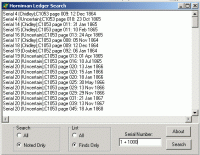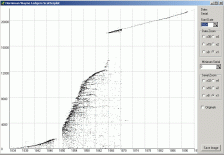| Home | Timeline | Documents | Audio | Software | Links |
Wheatstone Ledger Related Software |
|||||
|
The instruments in the earlier Wheatstone ledgers seem to be sold in a very jumbled serial number order, which makes it hard to locate a particular instrument. I have recently investigated this, and have written an article The Serial Number Muddle in Early Wheatstone Ledgers. The data produced during this investigation has been used to create indexes of the ledgers (see Serial Number and Date Indexes to the Wheatstone Ledgers). Wheatstone Ledger Utility Software
Two small utility programmes for Microsoft Windows have been written to assist in searching for ledger entries for serial numbers and visualising graphically how the serial numbers are muddled. They are available in a zip file (440K bytes), and are currently supplied with data for all pre 1900 ledgers (C104a, C1046 to C1054) and the first few pages of SD01 (1910). These programmes are supplied without any guarantees or support. Use them at your own risk! Instructions: 0. Download the zip file. 1. Create a directory. 2. Unzip the file to this directory 3. Three files will be unzipped:
Source CodeIf you would like to write your own programmes for investigating the ledger data, various source code options are available to get you started, all released under the GNU General Public Licence. Delphi source code (71K) for the utilities above is available, written using Borland Delphi Version 5. It is compiled using the standard version, and should compile under V5 or any higher version, including the free 'Personal' versions, as long as the widely available RXLib is installed. If you would prefer to use open-source software, I'd recommend Lazarus, a very good cross platform, Delphi-like, software development system. Lazarus source code (73K) versions of the utilities are available. For real software geeks, a C++ class and examples for searching the ledger transcriptions is available, supplied with console and MSWin front ends and their executables (250K bytes). The source code compiles under the open-source Dev-C++ IDE (again recommended!) using mingw, so should work with any gnu style C++ compiler. 
|




